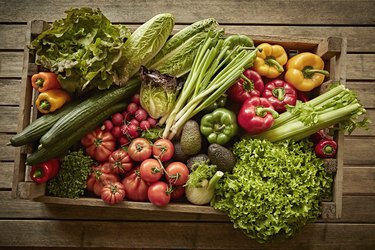
Vegetables make up an important part of a healthy diet, with a recommended intake of 2 to 3 cups per day for all adults. One of the primary health benefits of vegetables is their high dietary fiber content. However, this refers to vegetables that have not been juiced, as this process degrades fiber and its benefits.
While dietary fiber can help relieve constipation, too much dietary fiber too quickly can cause constipation, as can insufficient water. This can make it seem like some vegetables cause constipation, rather than help relieve the ailment. The higher the fiber content in vegetables, the greater your chance of constipation if you are not used to a high-fiber diet.
Video of the Day
Video of the Day
Tip
Certain types of vegetables in and of themselves aren't necessarily the cause of constipation. But if you're not used to a high-fiber diet, than eating lots of vegetables can lead to constipation, especially if you're not drinking enough water.
What Is Constipation?
Constipation is known as either infrequent bowel movements, or bowel movements that produce stools that are hard, dry, small and difficult to pass, often causing pain. Other symptoms of constipation include bloating and pain in the belly.
While you might think that regular bowel movements means once a day, constipation is defined by the National Digestive Diseases Information Clearinghouse as less than three bowel movements a week. A diet high in dietary fiber can help relieve the symptoms of constipation, as well as possibly prevent it.
Read more: 7 Weird Facts About Poop
Dietary Fiber and Vegetables
Vegetables are naturally high in dietary fiber, containing both soluble and insoluble fiber, both of which can help with relieving constipation, although suddenly eating many more vegetables can lead to constipation.
Vegetables that are especially high in fiber include most legumes, such as lima beans and lentils, as well as spinach. Vegetables that are good sources of fiber are broccoli, Brussels sprouts, onions and sweet potatoes.
Read more: The 18 Most Nutritious Vegetables
Amount of Dietary Fiber
While the recommended dietary intake for dietary fiber is 25 to 38 grams per day, most adults do not include enough fiber in their diet. Dietary fiber is also associated with lower LDL ("bad") cholesterol levels, as well as reduced risk for cardiovascular disease.
If you're only starting to increase your vegetable intake, do so gradually, as too much fiber at once can be hard for your system to process, making your constipation worse. Cooking vegetables softens their fiber content, making them easier to digest than raw vegetables for those who are unused to a diet high in dietary fiber.
Soluble vs. Insoluble Fiber
Soluble fiber binds with water, producing a gel substance that creates a soft bulk, softening hard stools. Insoluble fiber, in turn, helps speeds the passage of waste through your system.
Both types of fiber help relieve different elements of constipation, the first softening the stools, and the second promoting regularity in bowel movements. Vegetables contain both soluble and insoluble fiber, and a diet high in vegetables — half your plate at each meal — will help you naturally increase your dietary fiber intake.
Read more: 19 High-Fiber Foods — Some May Surprise You!
Hydration and Fiber
To ensure eating vegetables helps relieve or prevent constipation rather than causing it, you need enough fluid intake throughout the day. This is especially important in the case of soluble fiber, as it absorbs water.
If you don't take in enough water while increasing your fiber intake, you may run the risk of dehydration. The recommended intake is between six and eight 8-ounce glasses of fluids, ideally water, each day — more if you are exposed to hot weather or are participating in physical activity.
- ChooseMyPlate.gov: All About the Vegetables
- National Digestive Diseases Information Clearinghouse: Constipation
- University of Kentucky: Vegetable Preparation for the Family
- Colorado State University Extension: Dietary Fiber
- MedlinePlus: Water in Diet
- Fruits and Veggies More Matters: Best of -- Fiber